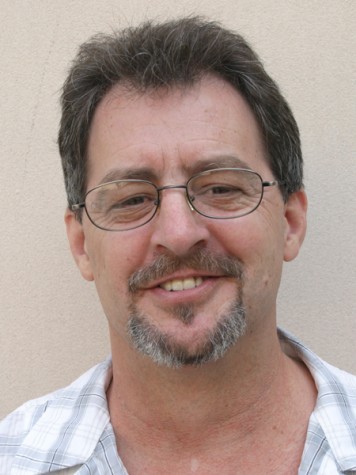A Glendale Community College student takes a brisk walk from Milky Way Cafe to Plaza Vaquero on his way to class. He hears the sound of a sharp whistle in the distance. His eyes follow the source of the sound to a group of people surrounding a man named Jeremiah, who is perched on stool whistling in the faces of his audience.
Is he an Army recruitment officer? No. He is one of the pro-Christian, anti-anything-else street preachers who show up on campus at least once every semester.
His message is as clear as the 4-foot banner it is written on: “Satan’s Children: Hypocrite Christians, Hebrews, Muslims, Buddhists, Hindus, Mormons, Jehovah’s Witnesses, and all other false religions. Scoffers, The Prideful, Atheists, Agnostics, Idolaters, and all other clueless fools. Repent or Hell.”
Many who gather around him, whether in praise, disgust, or humor, wonder whether groups like this have the right to spew such messages on campus, and more importantly, why they would want to.
Although GCC abides by the first amendment, there are some restrictions on the time and place for such displays of free speech.
First, there are only certain areas on campus in which freedom of speech can be exercised. These limited-public forums, which are open to students and the community, include Plaza Vaquero and San Gabriel Plaza.
Areas that are classified as non-public forums where the first amendment rights are more limited include campus offices, classrooms, libraries, and cafeterias.
According to Free Speech
Board Policy 5410, the superintendent or president, in accordance with the Campus Executive Committee, has the
right to remove an area’s desig-nation as a limited-public forum at any time, if it becomes a disrup-tion to surrounding classrooms.
Additionally, the Dean of Student Affairs must be informed of those using the forums in order to set time restrictions. This is done to avoid monopolization by any particular group and to ensure that all students and groups get a chance to make use of the space
Despite these regulations, 22-year-old Artur Asaduriyan, a three-year street preaching veteran of the Unshakable Youth Group program at Christian Outreach For Armenians Church in Glendale, often preaches on campus without approval.
“The rules about informing administration was something the colleges implemented so they could control who comes and who doesn’t,” said Asaduriyan. “Once you tell them, they have the right to refuse you.”
Although students and groups using the forums have the right to appeal the college regulations in U.S. District or Federal courts, the ruling is not always in their favor.
The 1968 landmark case Tinker vs. Des Moines, which dealt with students who wore armbands in protest of the Vietnam War, set the standard for students’ right to express themselves as long as it was not “disruptive and did not impinge upon the rights of others.”
Whether religious street preaching can be classified as disruptive really depends on the audience.
Arthur Artounian, a 20-year-old aerospace engineering major said, “The preaching is distracting to students and it makes me feel like they’re imposing their religious beliefs on me.”
In contrast, accounting major Argo Asatryan, 20, believes that freedom of speech ties together with freedom to listen.
“It’s their right to preach whatever they want,” said Asatryan. “But that doesn’t mean that I have to listen to them.”
The street preachers feel their cause is worthy, despite the controversy that surrounds it.
“When I preach, I stay calm and keep it on a very intellectual level,” said Asaduriyan. “My goal is to provoke people into thinking about God.”
Some who gather to hear the speeches support the preacher’s efforts toward trying to guide people onto the right religious path, while others feel that they are witnessing something close to a hate speech.
Andre Moradian, a 17-year-old college employee reasoned with students who disapproved of the preaching.
“He’s doing this out of love,” he said. “He’s not attacking anyone, he’s just warning them.”
Armen Haftvani, 20, shook his head disapprovingly has he sat and listened to Jeremiah.
“[As a Christian] I’m embarrassed,” said Haftvani. “He’s spouting hate and he’s being hypocritical.”
Asaduriyan and his youth group members along with members of the Truth Movement Club at GCC are planning to organize a debate on the campus between philosophy professors and Christians regarding the existence of God
Asaduriyan hopes that moving the religious debate to a more formal venue will spark more interest in the subject and more voices on the platform.

